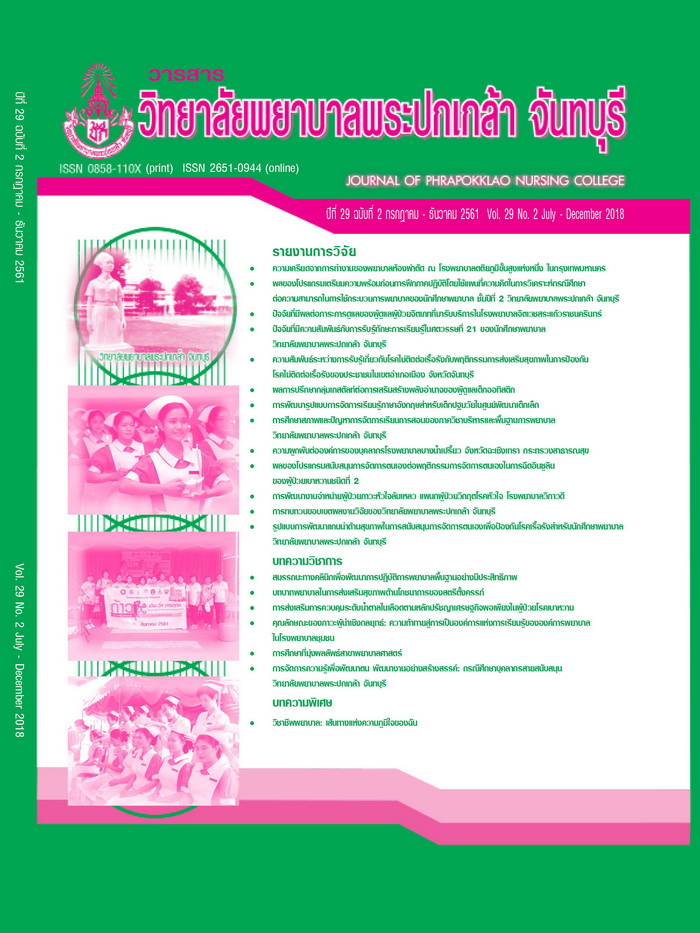The Scoping Review of Research in Prapokklao Nursing College
Keywords:
Scoping review, Research, NursingAbstract
This cross-sectional descriptive research using scoping review method aimed to review the scope of knowledge related to the methodology of research. The samples consisted of 71 researches that produced by instructors of Phrapokklao Nursing College, Chanthaburi during A.D. 2007-2016. The research instrument was a coding sheet comprised general data of research and characteristics of methodology of research. Data were collected from June to September, 2017. Statistics used for data analysis included frequency and percentage.
The research results revealed that most of the research was nursing research (52.10%), published in national/international journal (67.60%) and the principal researcher is the instructor in the college (77.50%). Methodological review showed most of the researches were quasi- experimental research (38%) and the sample was general population (36.60%). The weak point of the research is not calculate the sample size (50.90%), most of the research use purposive sampling (68.90%). Most of the data was collected using questionnaire (56.30%), no content validity index reported (42.60%) and reported reliability (72.10%). No controlling for confounding variables was performed (60.60%). The random sampling method was used to control confounding variables (50.10%). The use of statistic was appropriate and consistant with research objective/ research hypothesis (93.40%). The research is required to report effect size value (80.30%) but most of them do not report (83.60%).
This research suggests that the administrators of Phrapokklao Nursing College, Chanthaburi should encourage instructors to develop their research methodology skills in order to increase the quality and trustworthy of the research.
References
ประณีต ส่งวัฒนา. (2552). สถานภาพและทิศทางการวิจัยทางการพยาบาล: มุมมองจากประสบการณ์. วารสารมหาวิทยาลัยนราธิวาสราชนครินทร์, 1(1), 1-7.
เอื้อมพร ทองกระจาย. (2558). การวิจัยทางการพยาบาลในสังคมไทย: ทบทวนอดีตและทิศทางอนาคต. วารสารพยาบาลศาสตร์และสุขภาพ, 38(1), 122-130.
Arksey, H., & O’Malley, L. (2005). Scoping studies: Towards a methodological framework. International Journal of Social Research Methodology: Theory & Practice, 8(1), 19-32. Retrieved from http://eprints.whiterose.ac.uk/1618/1/Scopingstudies.pdf
Castrillón Agudelo, M. C. (2004). Trends and priorities in nursing research. Revista Latino-Americana deEnfermagem, 12(4), 583-588.
Davis, K., Drey, N., & Gould, D. (2009). What are scoping studies? A review of the nursing literature. International Journal of Nursing Studies, 46(10), 1386-1400.
Summers, S. (1991). Defining components of the research process needed to conduct and critique studies. Journal of Post Anesthesia Nursing, 6(1), 50-55.
Downloads
Published
How to Cite
Issue
Section
License
Copyright (c) 2018 JOURNAL OF PHRAPOKKLAO NURSING COLLEGE

This work is licensed under a Creative Commons Attribution-NonCommercial-NoDerivatives 4.0 International License.
เนื้อความ ข้อมูล และรายการอ้างอิงที่ผู้เขียนใช้ในการเขียนบทความเพื่อลงตีพิมพ์ในวารสารวิทยาลัยพยาบาลพระปกเกล้า จันทบุรี ถือเป็นความคิดเห็นและความรับผิดชอบของผู้เขียน คณะผู้จัดทำวารสารไม่จำเป็นต้องเห็นพ้องด้วยหรือร่วมรับผิดชอบ
บทความที่ได้รับการลงตีพิมพ์ในวารสารวิทยาลัยพยาบาลพระปกเกล้า จันทบุรี ถือเป็นลิขสิทธิ์ของวารสารวิทยาลัยพยาบาลพระปกเกล้า จันทบุรี หากหน่วยงานหรือบุคคลใดต้องการนำส่วนหนึ่งหรือทั้งหมดของบทความไปเผยแพร่ต่อเพื่อวัตถุประสงค์ใด ๆ จะต้องได้รับอนุญาตจากบรรณาธิการวารสารก่อน



